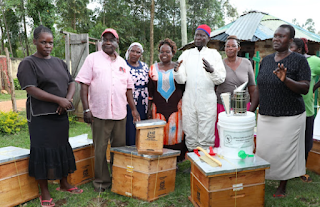Beekeeping Blossoms: Empowering Women and Youth in Kakamega through Sustainable Ventures
Embarking on a journey of economic empowerment, women and youths in Kakamega have found a sweet spot in beekeeping ventures. Against the backdrop of lush forestland and abundant bee forage, individuals like Wycliffe Ingosi and his team are redefining livelihoods by nurturing beehives laden with rosemary, lavender, and lemon grass.
The Morning Rituals of Beekeeping
In Kakamega county, beekeeping has become a vital socio-economic activity, blending tradition and innovation. Every morning, Ingosi and his team, adorned in white aprons and mesh hats, collect buckets of aromatic herbs to cleanse and invigorate their beehives. These hives, strategically placed along the North-South axis to prevent bee drift, stand as testaments to the region's commitment to sustainable beekeeping practices.
Empowerment Through Beehives
The Ministry of Agriculture in Kakamega, recognizing the potential of beekeeping, has taken strides to distribute beehives to women and youth-led groups. These initiatives aim to provide economic empowerment, particularly to those with limited resources. The wooden square boxes, topped with metallic covers, are mounted on green stands within sheltered sheds to shield them from strong winds.
"Beekeeping is ideal for any 'hustler' like me who may have no land or capital. Bees are also the ideal livestock to keep because they are environmentally friendly," shares Ingosi, emphasizing the accessibility and eco-friendly nature of this venture.
Communities Embracing Beekeeping
Communities like Imulama in Ikolomani constituency have embraced beekeeping as a means of income generation. Liz Makumba, a member of a local chama, expresses the positive impact: "We used to travel long distances to buy honey, and we would at times get fake products, but with our own, we are sure of consuming quality honey."
Chief Officer of Livestock, Veterinary Services, and Fisheries, Jessicah Wesonga, highlights the significance of beekeeping in eradicating poverty among women and youth. Aligned with Governor Fernandes Barasa's development agenda, the initiative not only fosters wealth creation but also contributes to food security.
Project Unveiling and Future Plans
The first phase of the Sh3 million beekeeping project, initiated last month, covered constituencies like Ikolomani, Likuyani, Mumias West, and Matungu. As part of the plan to expand economic opportunities, the next phase, beginning next year, will encompass remaining constituencies in Kakamega.
Wesonga emphasizes the profitability of beekeeping, stating, "Bees produce various products, from honey to propolis and beeswax, which fetch good money in the market, making beekeeping one of the most profitable economic activities."
As protective gear, smokers, hive tools, bee brushes, and catcher boxes are provided to equipped groups, Kakamega's beekeeping initiative not only promises economic upliftment but also underscores the region's commitment to sustainable practices. Each hive, on average, has the potential to produce up to 60 kg of honey annually, adding a sweet note to the region's journey towards prosperity.
#KakamegaBeekeeping, #SustainableEmpowerment, #EconomicDevelopment, #YouthInnovation, #WomenEntrepreneurs

